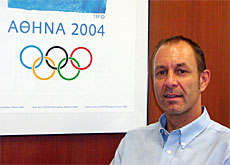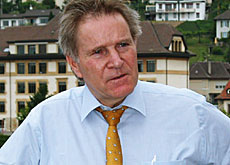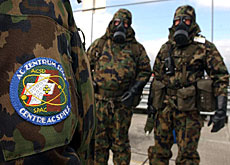Security fears dog Swiss Olympic preparations

Switzerland is sending a member of its armed forces to the Olympic Games for the first time to watch over the country’s athletes.
In an interview with swissinfo, Werner Augsburger, head of the Swiss Olympic team, talks about security issues and the chances of success in Athens.
With less than three weeks to go before the curtain lifts on the Summer Games, three issues continue to dominate the build-up: terrorism, doping and whether the Greeks will be ready in time.
The Greek authorities are mounting the biggest security operation in the history of the Games at a cost of more than $1.5 billion (SFr1.8 billion).
Nato is providing counter-terrorism assistance, as well as air and sea patrols. Switzerland is supplying expertise and equipment to protect against biological or chemical attacks.
Last week it was reported that a number of countries, including the US, Britain and Australia, had asked the Greek government if they could send armed guards to the Games.
swissinfo: Is it true that Swiss soldiers will be accompanying the team to Athens?
Werner Augsburger: We have decided to integrate one security person from the Army within the team. This person will not wear a military uniform and will not carry a weapon.
He will have access to intelligence information from the Greek government, and if something were to happen then he’s there to help and advise us.
There are other nations that have been doing this for years, like Germany since 1972. We know that Denmark has had two people permanently in their mission since Barcelona. For us, this is the first time.
swissinfo: Why do you perceive the threat to be more serious in Athens than in Sydney in 2000?
W.A.: Specialists say the situation has changed, especially after September 11. We know that many, many different things could happen in Athens, but we also know that it will probably be the most heavily protected city in the world during those two weeks in August.
swissinfo: Is Athens going to be ready on time?
W.A.: It’s going to be tight, but I think the things that have to be ready will be ready on time. Maybe not in the Swiss manner, because the Swiss are used to having everything really tidy and perfectly clean. Some construction areas will probably not be cleared up.
The main stadiums have to be ready. The schedule is so tight during those two weeks that most of the competitions have to take place at the time announced.
swissinfo: The Swiss won nine medals in Sydney – their best haul since 1952. Are they in a position to beat that in Athens?
W.A.: I don’t think so. The nine medals in Sydney were a very good result for a country the size of Switzerland. The potential we have for Athens is somewhere between five and nine. The minimum goal will be five; if we reach nine, then we will be really, really happy.
swissinfo: Apart from Roger Federer in the tennis, where are the Swiss likely to get a gold?
W.A.: Cycling; either on the track, in a time trial, or mountain biking. Those are the disciplines where we think we can win maybe one, two or even three medals.
Then there’s beach volleyball. We have two men’s teams that are playing really well, and we think we can win a medal, hopefully gold.
swissinfo: What about on the athletics track?
W.A.: If you look at the level of Swiss athletics, we don’t think there is any potential right now to win a medal. If an athlete like André Bucher [former world champion at 800m], who has so far not reached his top level, hits form over the next four weeks then he sure has the potential to put in a great performance. But a medal is a long shot.
swissinfo: Doping has already cast a shadow over the Games. A number of US athletes are under suspicion. Is this proof that testing is working or are there more cheats out there?
W.A.: I would say the shadow that you mention is not over the whole Olympics but over the American athletes. We are really happy with what is going on in the US because the anti-doping agency there is really doing its job.
It may be negative for the sport right now, but in the long run this is the only way to prove to the public that everything possible is being done to make the sport clean.
swissinfo: Are you expecting more athletes to test positive during the course of the Games?
W.A.: I hope there will be the smallest number possible of positive athletes. But we expect and hope that WADA [World Anti-Doping Agency], together with the national Olympic committees, will do the best job possible to find those that try to cheat. But it is unrealistic to hope that we can have a sport that is 100 per cent clean.
swissinfo-interview: Adam Beaumont
Greece is mounting the biggest security operation in the history of the Games at a cost of more than $1.5 billion.
The US is sending 400 special forces troops to help protect the Games.
Around 16,000 athletes and coaches from more than 200 countries will be in Athens.
More than 20,000 members of the media are covering the event.

In compliance with the JTI standards
More: SWI swissinfo.ch certified by the Journalism Trust Initiative


You can find an overview of ongoing debates with our journalists here. Please join us!
If you want to start a conversation about a topic raised in this article or want to report factual errors, email us at english@swissinfo.ch.